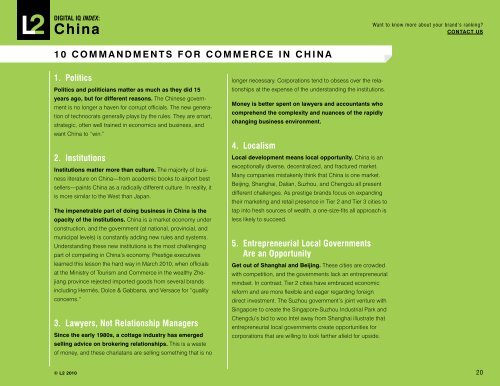China - L2: A Think Tank for Digital Innovation
China - L2: A Think Tank for Digital Innovation
China - L2: A Think Tank for Digital Innovation
Create successful ePaper yourself
Turn your PDF publications into a flip-book with our unique Google optimized e-Paper software.
<strong>Digital</strong> IQ Index:<strong>China</strong>Want to know more about your brand’s ranking?CONTACT US1 0 C O M M A N D M E N T S F O R C O M M E R C E I N C H I N A1. PoliticsPolitics and politicians matter as much as they did 15years ago, but <strong>for</strong> different reasons. The Chinese governmentis no longer a haven <strong>for</strong> corrupt officials. The new generationof technocrats generally plays by the rules. They are smart,strategic, often well trained in economics and business, andwant <strong>China</strong> to “win.”2. InstitutionsInstitutions matter more than culture. The majority of businessliterature on <strong>China</strong>—from academic books to airport bestsellers—paints <strong>China</strong> as a radically different culture. In reality, itis more similar to the West than Japan.The impenetrable part of doing business in <strong>China</strong> is theopacity of the institutions. <strong>China</strong> is a market economy underconstruction, and the government (at national, provincial, andmunicipal levels) is constantly adding new rules and systems.Understanding these new institutions is the most challengingpart of competing in <strong>China</strong>’s economy. Prestige executiveslearned this lesson the hard way in March 2010, when officialsat the Ministry of Tourism and Commerce in the wealthy Zhejiangprovince rejected imported goods from several brandsincluding Hermès, Dolce & Gabbana, and Versace <strong>for</strong> “qualityconcerns.”3. Lawyers, Not Relationship ManagersSince the early 1980s, a cottage industry has emergedselling advice on brokering relationships. This is a wasteof money, and these charlatans are selling something that is nolonger necessary. Corporations tend to obsess over the relationshipsat the expense of the understanding the institutions.Money is better spent on lawyers and accountants whocomprehend the complexity and nuances of the rapidlychanging business environment.4. LocalismLocal development means local opportunity. <strong>China</strong> is anexceptionally diverse, decentralized, and fractured market.Many companies mistakenly think that <strong>China</strong> is one market.Beijing, Shanghai, Dalian, Suzhou, and Chengdu all presentdifferent challenges. As prestige brands focus on expandingtheir marketing and retail presence in Tier 2 and Tier 3 cities totap into fresh sources of wealth, a one-size-fits all approach isless likely to succeed.5. Entrepreneurial Local GovernmentsAre an OpportunityGet out of Shanghai and Beijing. These cities are crowdedwith competition, and the governments lack an entrepreneurialmindset. In contrast, Tier 2 cities have embraced economicre<strong>for</strong>m and are more flexible and eager regarding <strong>for</strong>eigndirect investment. The Suzhou government’s joint venture withSingapore to create the Singapore-Suzhou Industrial Park andChengdu’s bid to woo Intel away from Shanghai illustrate thatentrepreneurial local governments create opportunities <strong>for</strong>corporations that are willing to look farther afield <strong>for</strong> upside.© <strong>L2</strong> 2010 <strong>L2</strong><strong>Think</strong><strong>Tank</strong>.com 20



